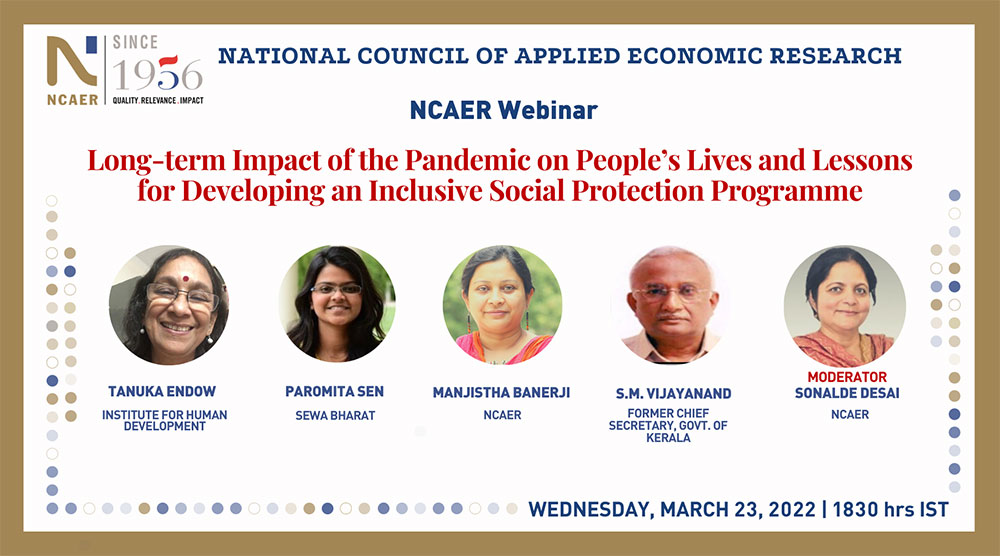
A webinar discussion on the Long-term impact of the pandemic on people’s lives and lessons for developing an inclusive social protection programme, moderated by Dr Sonalde Desai, Professor, NCAER, was held on March 23, 2022.
The COVID-19 pandemic could have a long-term impact for the people of the country due to the unexpected deaths of family members, loss of livelihoods, decline in household income, school closures and inability to access alternative methods of remote learning for students, and lack of access to routine healthcare services. The NCAER National Data Innovation Centre in collaboration with the Chronic Poverty Advisory Network (CPAN) recently published the India COVID-19 Poverty Monitor Bulletin assessing the consequences of the pandemic for the vulnerable populations and the risks of impoverishment faced by them. CPAN’s COVID-19 Poverty Monitoring Initiative is supported by the Covid Collective, a rapid social science research response to inform decision-making on COVID-19 related development challenges.
As a follow-up to the launch of the bulletin, we are organising a webinar to analyse the potential long-term impact of the pandemic on people’s lives and lessons to be learnt for developing an inclusive social protection programme. The panellists at this discussion comprise researchers, policy makers, and bureaucrats with extensive on-ground experience, as well as an overall understanding of the impact of the pandemic and social protection programmes that could help mitigate this impact.
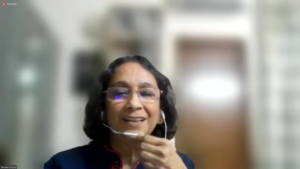 Tanuka Endow is a Professor at the Institute for Human Development (IHD) and the co-ordinator for the Centre for Gender Studies at IHD. Her work is mainly in the area of education, including on the issues of out-of-school children and low-cost private schools. She has worked on Human Development reports and vision documents for various States, including Delhi and Uttarakhand. She has recently contributed to a Human Development Report for the Scheduled Tribes. Dr Endow has engaged in a collaborative study with UNICEF on the post-COVID situation for vulnerable populations in India.
Tanuka Endow is a Professor at the Institute for Human Development (IHD) and the co-ordinator for the Centre for Gender Studies at IHD. Her work is mainly in the area of education, including on the issues of out-of-school children and low-cost private schools. She has worked on Human Development reports and vision documents for various States, including Delhi and Uttarakhand. She has recently contributed to a Human Development Report for the Scheduled Tribes. Dr Endow has engaged in a collaborative study with UNICEF on the post-COVID situation for vulnerable populations in India.
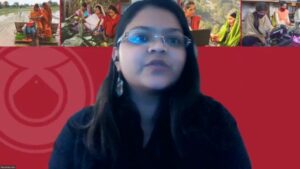 Paromita Sen set up and now runs the Research and Data Vertical at SEWA Bharat, where she and her team conduct research on entrepreneurship, empowerment, labour, disaster resilience, and leadership amongst others—all through the lens of gender and the informal economy. Under the aegis of the SEWA leadership, she has represented SEWA and has been involved in work with NITI Aayog, the Delhi Government, National Rural Livelihood Mission (NRLM), Commission on the Status of Women (CSW), International Labour Organization (ILO), and the Lok Sabha, amongst others.
Paromita Sen set up and now runs the Research and Data Vertical at SEWA Bharat, where she and her team conduct research on entrepreneurship, empowerment, labour, disaster resilience, and leadership amongst others—all through the lens of gender and the informal economy. Under the aegis of the SEWA leadership, she has represented SEWA and has been involved in work with NITI Aayog, the Delhi Government, National Rural Livelihood Mission (NRLM), Commission on the Status of Women (CSW), International Labour Organization (ILO), and the Lok Sabha, amongst others.
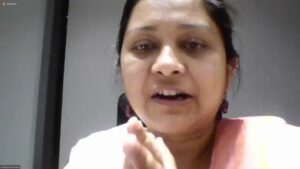 Manjistha Banerji is a Fellow at National Council of Applied Economic Research (NCAER). Her primary areas of research are education, family demography, social change and gender, migration, and survey methods. At the NCAER National Data Innovation Centre (NDIC), she is involved with experimentations on different data collection techniques, telephonic surveys to assess the impact of the COVID pandemic in Delhi NCR, qualitative data collection to understand the risk of impoverishment in the context of COVID-19, and in questionnaire design for the upcoming round of the India Human Development Survey (IHDS).
Manjistha Banerji is a Fellow at National Council of Applied Economic Research (NCAER). Her primary areas of research are education, family demography, social change and gender, migration, and survey methods. At the NCAER National Data Innovation Centre (NDIC), she is involved with experimentations on different data collection techniques, telephonic surveys to assess the impact of the COVID pandemic in Delhi NCR, qualitative data collection to understand the risk of impoverishment in the context of COVID-19, and in questionnaire design for the upcoming round of the India Human Development Survey (IHDS).
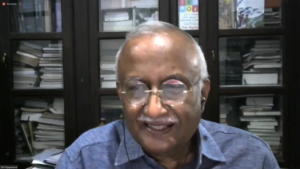 S.M. Vijayanand is Former Chief Secretary to the Government of Kerala. He has earlier also served in various capacities in the Government of India, including as the Secretary, Ministry of Panchayati Raj; and Additional Secretary, Ministry of Rural Development, among other positions. He spearheaded the Rajiv Gandhi Drinking Water Mission, Ministry of Sanitation, Government of India (1992-1996). He has also conceptualised and operationalised ‘Kudumbashree’, a women’s Self-Help Group movement in the State of Kerala.
S.M. Vijayanand is Former Chief Secretary to the Government of Kerala. He has earlier also served in various capacities in the Government of India, including as the Secretary, Ministry of Panchayati Raj; and Additional Secretary, Ministry of Rural Development, among other positions. He spearheaded the Rajiv Gandhi Drinking Water Mission, Ministry of Sanitation, Government of India (1992-1996). He has also conceptualised and operationalised ‘Kudumbashree’, a women’s Self-Help Group movement in the State of Kerala.
 Sonalde Desai is a Professor at NCAER with a joint appointment as Distinguished University Professor in the Department of Sociology at the University of Maryland. She directs the NCAER-National Data Innovation Centre (NDIC). She is an internationally known demographer whose work deals primarily with human development in developing countries with a particular focus on gender and class inequalities. At present, she is leading the India Human Development Survey (IHDS), India’s only nationally representative panel study conducted in two rounds in 2004–05 and 2011–12. Preparations are currently on for the next round of IHDS.
Sonalde Desai is a Professor at NCAER with a joint appointment as Distinguished University Professor in the Department of Sociology at the University of Maryland. She directs the NCAER-National Data Innovation Centre (NDIC). She is an internationally known demographer whose work deals primarily with human development in developing countries with a particular focus on gender and class inequalities. At present, she is leading the India Human Development Survey (IHDS), India’s only nationally representative panel study conducted in two rounds in 2004–05 and 2011–12. Preparations are currently on for the next round of IHDS.